In North Carolina, vote will be a test of new, tighter election laws – and of voters' faith
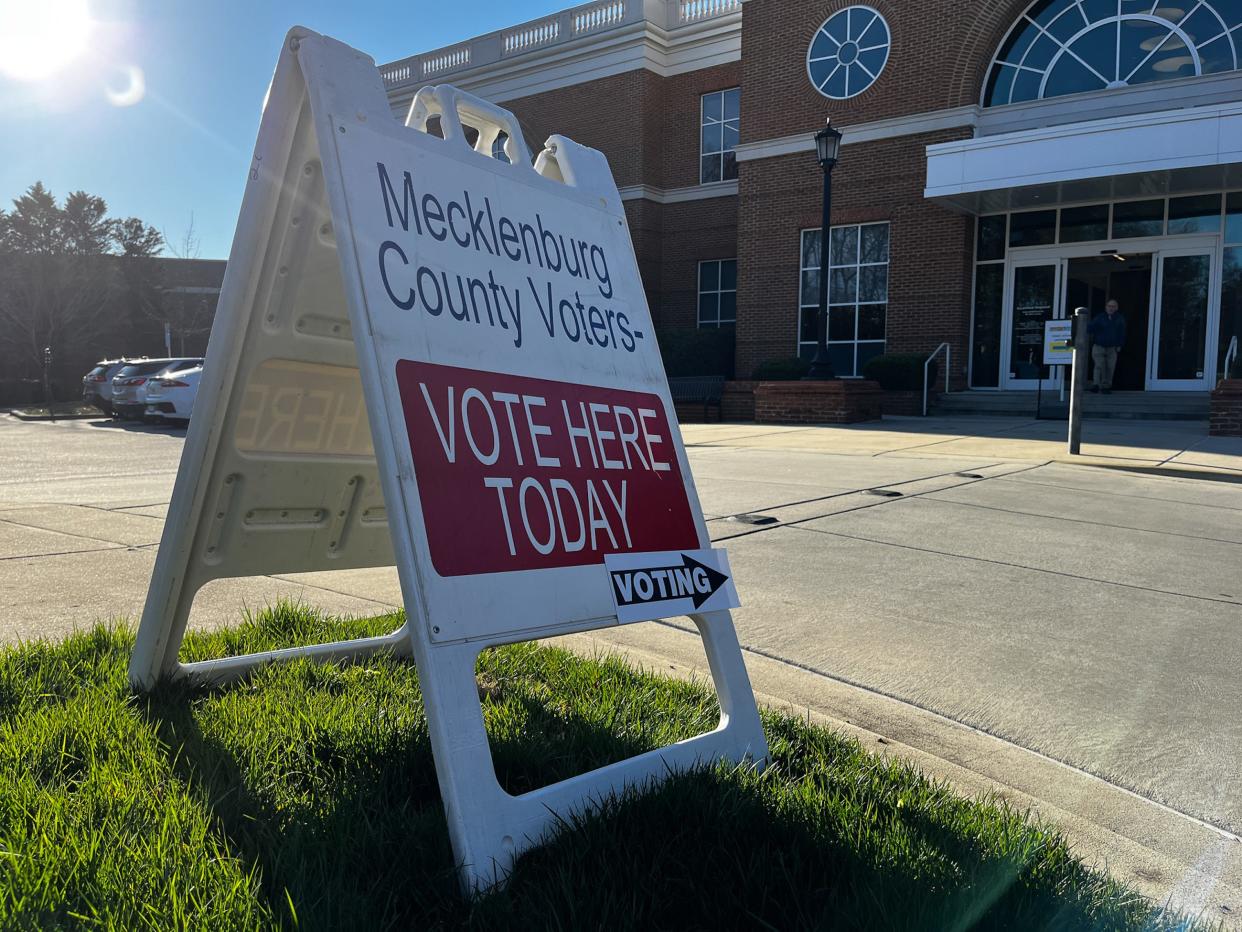
DURHAM, N.C. – On the last Sunday of February, a sea of sharp suits and dresses flowed out of St. Joseph AME Church. Worship was over, but early balloting in North Carolina’s primary election was still open. It was time to vote.
The congregation had been fired up by a nearly two-hour service, filled not just with gospel music but also sermons about threats to hard-won voting rights from a slate of more restrictive laws that have taken effect in the past year.
New limits on the time to return mail-in ballots. A ban on ballot drop-boxes. A law – once struck down as unconstitutional, then revived by a new conservative majority on the state supreme court – requiring voter ID at the polls.
On top of that, the latest redistricting maps were being challenged by lawsuits that argued they diluted Black electoral influence and were designed to keep the GOP in control of most legislative seats.
“These are attempts to suppress votes,” the pastor, the Rev. Jay Augustine, said before the service.
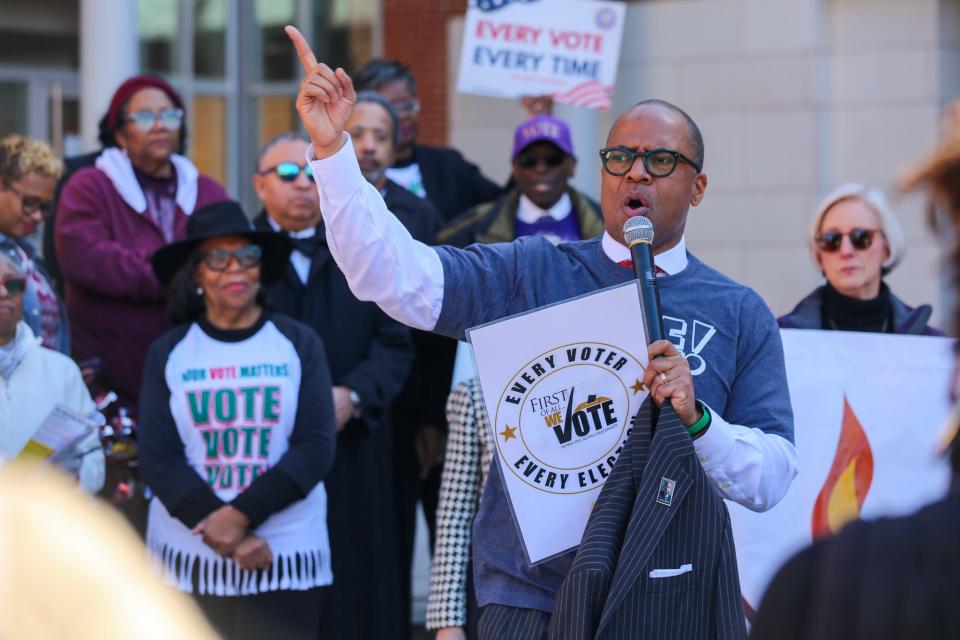
Soon the crowd was lined up in cars or had boarded a bus with a paper sign pasted onto the driver-side door that read “Souls to the polls.” They rode in a caravan to a nearby polling site, arriving to music from a live DJ and signs for various candidates.
“We shouldn’t have things that stop people from voting,” said Carla Gilchrist, 52, an elementary school teacher who arrived at the polling place with the church caravan. New barriers, she said, only cemented her desire to vote.
North Carolina last year was among 14 states to enact laws in the name of election security that will make it more difficult for some to vote in 2024, according to the Brennan Center for Justice, a nonpartisan policy group. The flood of laws in various states emerged following claims of voting fraud in the wake of Donald Trump’s 2020 defeat.
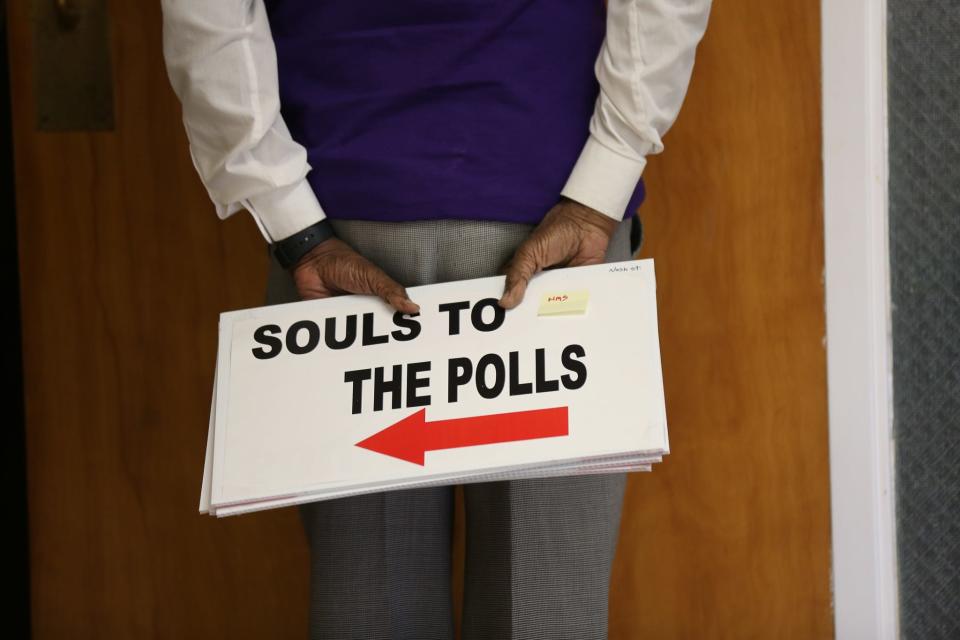
Voting rights groups worry that confusion over the new requirements could dent turnout among the state’s 7.3 million registered voters, particularly Black or poor voters. And they argue that even a small reduction could have outsize effects in a competitive state, where Trump beat Joe Biden in 2020 by 1.35 percentage points.
On March 5, North Carolina will be among the 15 states picking presidential, state and local candidates in the Super Tuesday primary. Ahead of that vote, advocates have been scrambling to educate voters, hold events and help people get qualifying forms of photo ID, all a dress rehearsal for a high-stakes general election.
At the same time, some Republicans who have pushed for the voting restrictions want even stricter rules. They say voters will easily adjust to new rules and predict that it will boost trust and therefore turnout.
For voters, it can be confusing to keep up amid a flurry of lawsuits. One change, which would have tightened rules on voters who register on the same day they cast a ballot during in-person early voting, was temporarily blocked by a federal judge in January.
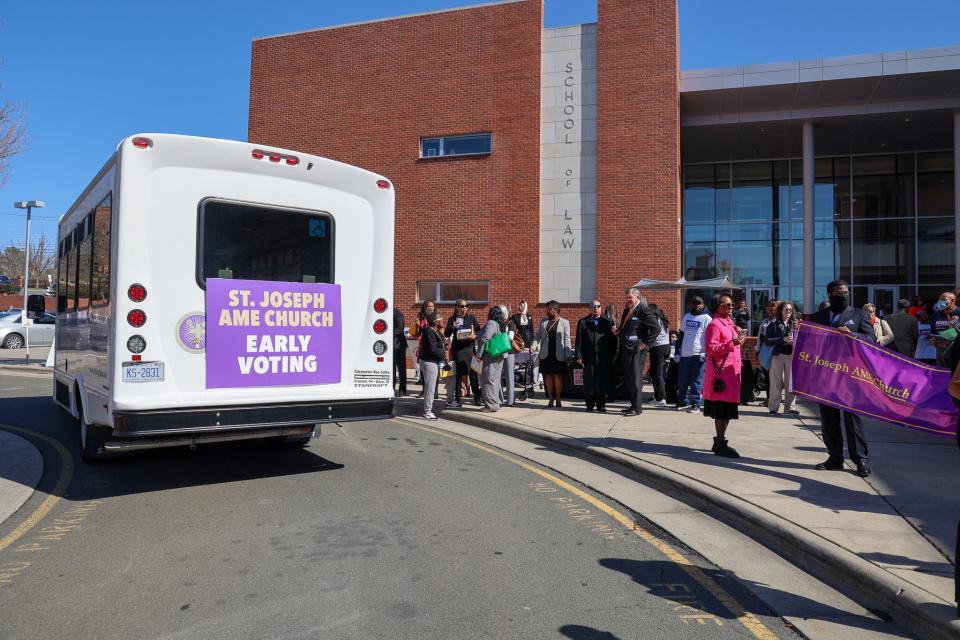
Yet for all the attention on voting rules, concerns about the mechanics may be eclipsed by election cynicism that for some is an even stronger deterrent to voting.
Some voters feel helpless because of gerrymandering, or conspiracy theories. Some simply doubt whether their votes can actually change the problems they see in rising rents, crime, immigration, America’s role in overseas wars and threats to democracy at home. The fundamental question is whether those people will stay away, or vote anyway.
So, in North Carolina’s 2024 elections – where Democrats hope to flip the state for Biden and Republicans want to win back the governor’s seat – sheer turnout may offer its own gauge of the effect of tightened voting laws, of this election year’s malaise, and of faith in the durability of the U.S. election system itself.
Voting rights advocates worry laws will curtail access
In her apartment with a view of Charlotte’s skyline, Rosemaria Bowden stood next to her sofa near a blood-pressure cuff and a bowl of plastic fruit on her coffee table, digging into her purse for her identification.
At 68, she’s retired after working years at a convention center. She has three grandchildren. She doesn’t drive. And when her purse was stolen last year, she worried she’d lost other forms of identification that she would need to vote under the state’s new ID law.
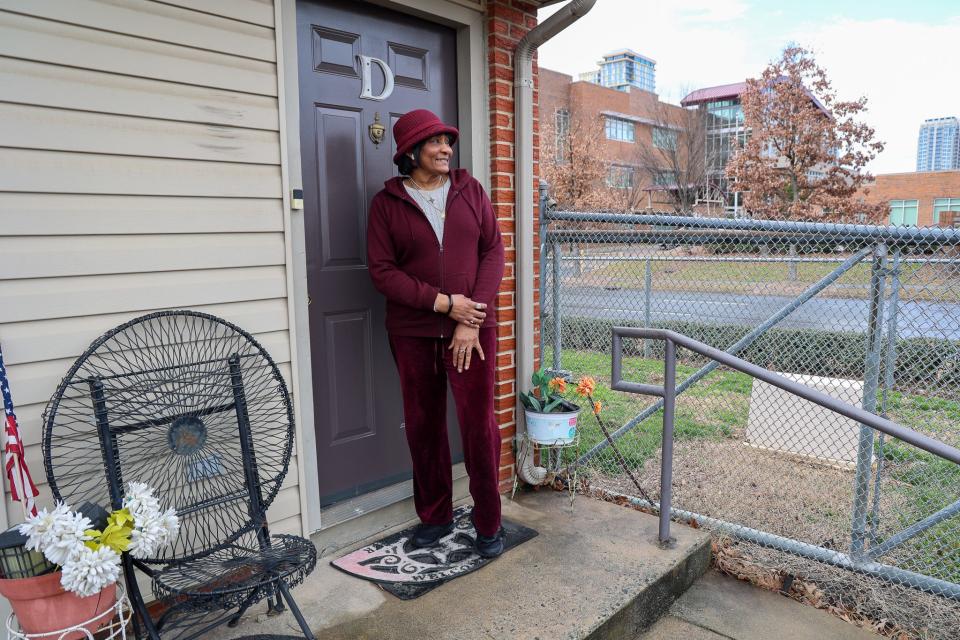
It would be a lot of red tape, as she’d also lost her Social Security card. But she thought of her parents, who had long instilled voting as a civic duty not to be taken for granted.
“My dad would talk about the one person who thought their vote wouldn’t count. What if you have 10,000 people thinking like you?” she said.
Voters first approved requiring voter ID at the polls as a constitutional amendment referred by the legislature in 2018 before it was halted by legal challenges and reinstated last year. But the voter ID requirement was just one of the changes enacted last year.
With a GOP supermajority in the Legislature overriding a veto by Democratic Gov. Roy Cooper, North Carolina saw new laws ending a three-day grace period to receive and count absentee ballots that were postmarked by Election Day, banning ballot drop boxes and requiring ballots cast by same-day registrants to be discarded if an address confirmation mailer was returned one time as undeliverable. Absentee voters also faced new rules that required including an ID photocopy with their mail-in ballot.
The Legislature expanded the rights of partisan poll watchers, too, allowing them more freedom within polling sites – but fueling concern about intimidation and adding to the strains on election officials, said Jeff Loperfido, the interim chief counsel of voting rights at the Southern Coalition for Social Justice. Since 2019, North Carolina has seen 56 changes in elections directors serving 100 counties.
And it sought to change the makeup of state and county election boards, taking power from the governor who had appointed a majority to the state board and evenly splitting seats between parties. Critics said the new setup could throw election disputes into deadlock. A legal challenge led a court to block the measure while it is litigated.
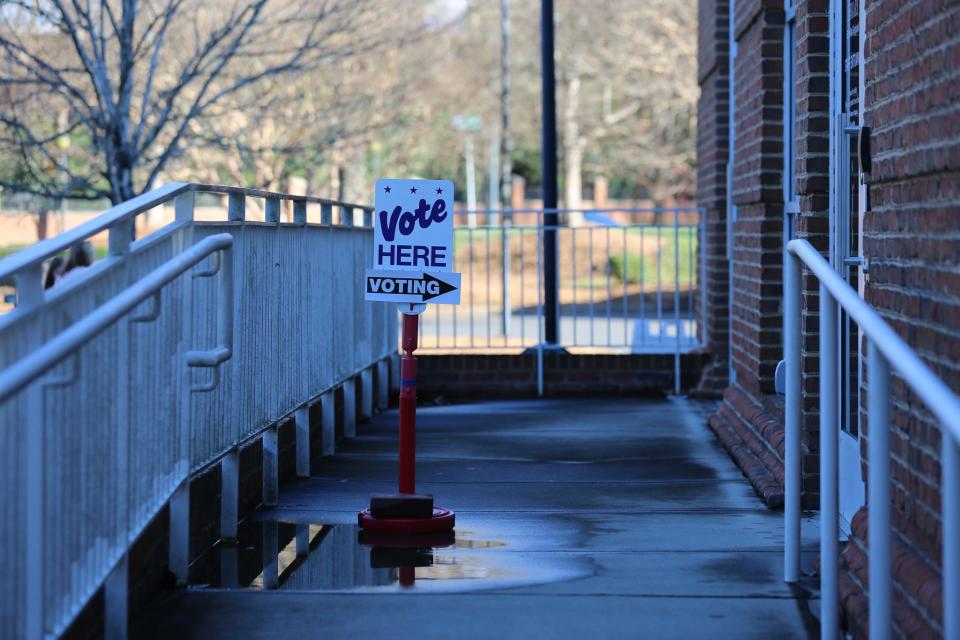
The laws first took effect for North Carolina’s 2023 municipal elections. There, a report from the voting group Democracy NC found, they created some problems: Some voters who did not present an acceptable photo ID did not receive an ID exception form, which allows people to vote with a form where they check one of various reasons for not having an ID with them. Other voters had their ballots rejected incorrectly by county boards of elections.
Chris Cooper, a Western Carolina University political science professor, said he does not think North Carolina’s new laws will shift overall outcomes of races or turnout in this year’s elections.
But such laws can have a disproportionate impact on specific groups, said Sara Carter, an attorney in the Brennan Center's Democracy Program. After the passage of restrictive election laws in Georgia, for example, the Brookings Institution found turnout gains in 2022 compared with 2018, but a turnout decline among nonwhite voters.
Bowden, despite not driving and losing her IDs, was determined to vote. She just had to figure out how.
She ultimately got a new ID with the help of VoteRiders, part of a large network of activists and volunteers who pay for rides and help people get driver’s licenses or other forms of ID.
But she worries that many people in situations like hers will be confused by the new laws, or see too narrow of a window in which to cast a ballot because of work or child care, and just decide not to bother.
“A lot of people I think will shy away from all that red tape. They’ll say, ‘My vote won't matter anyway,’ you know, and they’ll back out,” she said.
She said some of her friends and neighbors feel increasingly put off by all the political maneuvering. In December, voting-rights advocates sued to overturn redistricting, alleging new voting maps weakened Black electoral influence and were designed to give Republicans an edge.
Yet she said many also feel let down by Biden because of crime, immigration and inflation. Long a Democrat, she says she still hasn’t decided on a presidential pick this time around. “A lot of a lot of people say, ‘I don't like neither one of them,’” she said.
She still plans to vote, the way her parents always told her, pulling out a framed photo of her mother to make her point. She isn’t so sure about her grandson.
At 18, this is the first time he’ll be eligible to cast a ballot. With the help from VoteRiders, Bowden made sure he got an ID. But she’s still trying to persuade him to vote.
“He said, ‘Grandma, I don’t even think I’m going to vote. … It doesn’t matter. The world’s so upside down,’” she said.
Conservatives say still stricter voting laws are needed
On a drizzly Saturday at a strip mall in rural Johnston County, a swath of conservative countryside seeing rapid new growth just southeast of Raleigh, candidate signs sat perched in pickup beds near an early voting site.
Inside, volunteer poll watcher Averil Glover kept a keen eye out for fraud, watching workers as they asked for IDs and scanned ballots scanned by tabulators. She was allowed to be there under new state rules giving poll watchers more room to move around the polling station.
So far, she saw few signs of trouble. But Glover said in her community, most people agree the 2020 election was stolen.
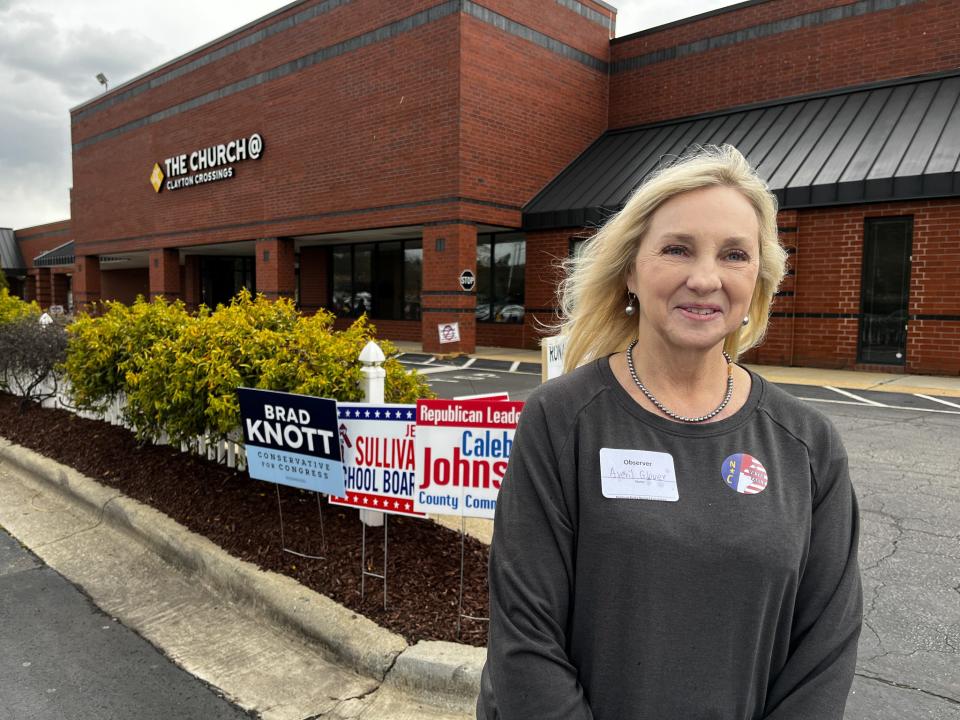
She worries that despite the new laws, opportunities for fraud still exist.
“I can’t trust anything that's hooked to a wall outlet,” she said. “Because anything can be hacked.”
In 2020, North Carolina saw allegations of fraud and calls for recounts after Trump declared victory in the state before absentee ballots were counted. (He ultimately won, by a margin of about 75,000 votes.)
Karen Brinson Bell, executive director of the State Board of Elections, told lawmakers last year that cases of voter fraud are extremely rare. But voting advocates say fears about fraud have become firmly rooted since 2020 and helped fuel the spate of new laws.
Some Republicans say changes don’t go far enough and contain too many loopholes. One is in the voter ID requirement: exception forms allow people to cast a ballot without ID for a wide range of reasons – if they know that they can use those forms.
“I think the affidavit where you can simply attest that you don't have it is silly," North Carolina House Speaker Tim Moore recently told local reporters, saying he’ll consider further “election integrity” measures and also wants to shorten the state’s early voting period.
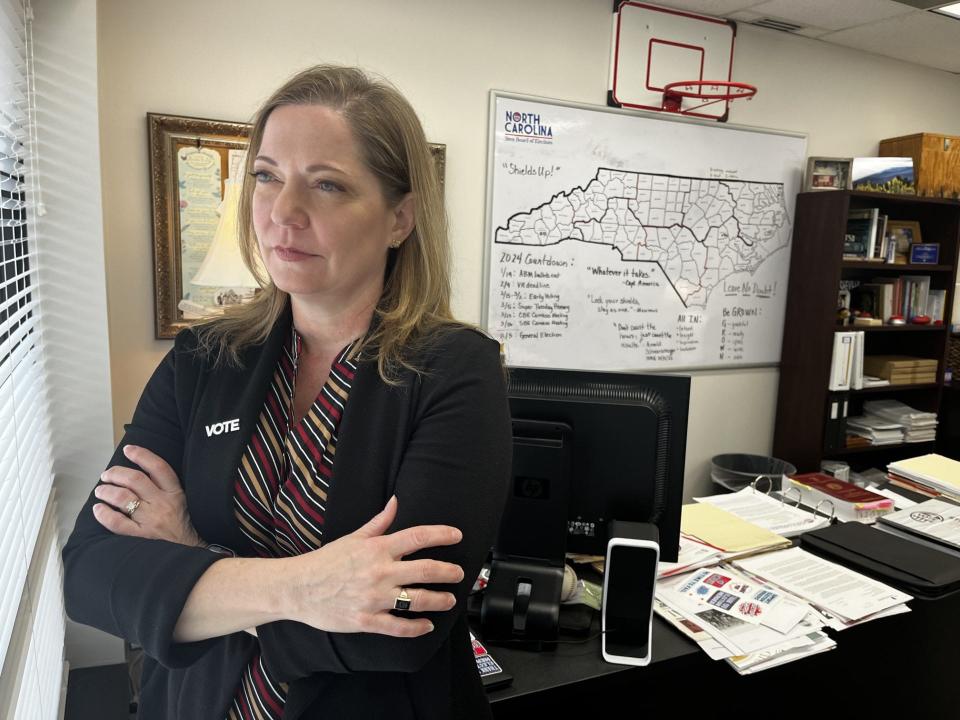
Jim Womack, a leader of the North Carolina Election Integrity Teams, a conservative group that organizes poll watching, said the group is training poll watchers during the primary for the general election. It’s part of a larger network connected to North Carolina-based attorney Cleta Mitchell, who participated in the January 2021 phone call Donald Trump made to the Georgia secretary of state urging him to find enough votes for a Trump victory.
Womack argued that tighter election rules will drive higher turnout among voters who don’t trust the results. But he also worries those same attitudes will keep people from voting.
A national Associated Press-NORC Center for Public Affairs Research poll last year found that only 22% of Republicans have high confidence that votes in the upcoming presidential election will be counted accurately, compared with 71% of Democrats.
“Voter disillusionment follows lack of trust in the elections. And that has a dampening impact more so on conservatives than it does on leftists,” he said.
Back in Johnson County, Glover said she believes voters will sweep Trump back into office partly amid anger over illegal immigration. She hopes people paid attention to the mailer alerting them to the ID requirement, and hopes people come out to vote.
“The Bible says when the world turns upside down, when you see so much evil spiraling down, bad things are going to happen,” she said. “And if the people don't come out and vote, then guess what? We're going to go down a deeper hole, and won’t be able to get out.”
Beyond election mechanics, larger issues loom
On a chilly night outside a Muslim community center near Charlotte, about a dozen people sat at circular tables under fluorescent lights, snacking on chips and soda.
From down the hall, sneakers squeaked from the floor of the gym as kids played basketball. Around the tables, the adults were waiting to hear about election law.
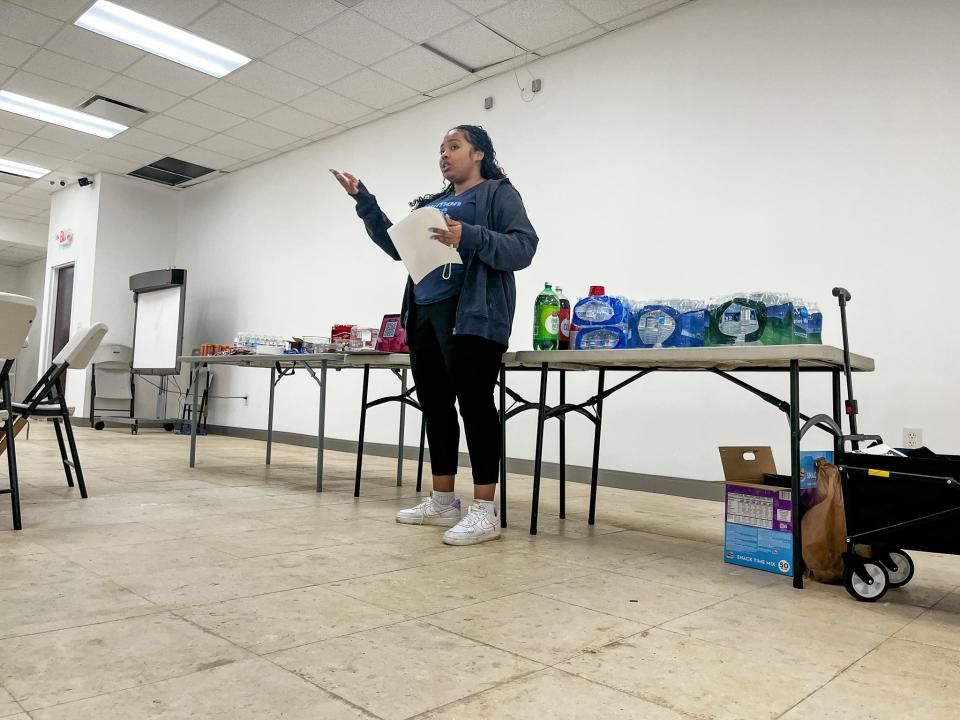
Laila El-Ali, 24, a Palestinian American behavioral therapist, enlisted an organizer from the voting rights group Common Cause to present at the event. She said she had hoped more people would show up.
El-Ali said that while people in her community were upset about the voting law changes, it was anger over the Biden Administration’s policy in the war between Israel and Hamas – which they view as fueling Palestinian death and suffering – that dominated their views on the election. Many now vow not to vote for Biden – or at all.
“People are losing faith, losing trust and they don't want to hit the polls,” El-Ali said. “They don’t feel like their vote is valuable. And they are in disagreement with both parties. So they think not voting is just going to solve their problems, or at least make a point.”
“I don’t even know personally what I’m going to do,” she said of her own vote.
Across the state, voting education groups are working not just to inform voters of the new laws but counter misinformation and reach voters “who are disaffected about voting, who say, ‘I feel like it’s no use,’” said Marques Thompson, organizing director of the group Democracy NC.
Bell, however, said actual numbers of early ballots, a week before the primary, may not presage such a lack of turnout. “We are up in the number that have been cast by mail. We are up in the number of early voters in this primary compared to 2020,” she said. “It’s not substantial, but it’s up.”
She believes that voter turnout this fall will ultimately reach the 75% seen in the state in 2022. An MIT Election lab survey in 2022 showed confidence that votes were counted as intended had improved in North Carolina – from 70.5% in 2020 to 85% – particularly among Republicans.
That could be seen at a library in a leafy Charlotte neighborhood, just over a week before the primary. Voters passed a sign stating that IDs were now required, before ducking behind a white trifold to cast votes.
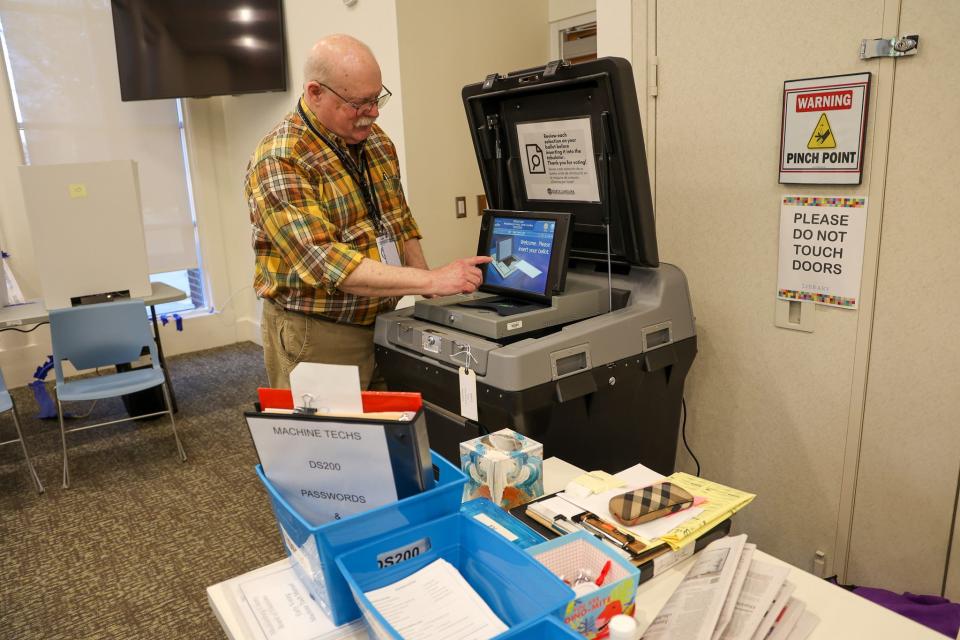
A few miles away, at the Mecklenburg County elections office, director Michael Dickerson said his staff had been hauling an ID-making camera around town to help make hundreds of voter IDs.
Dickerson, who spent nearly 40 years as an election official in North Carolina and with the Federal Election Commission, said he’s seen it all – death threats over early voting, rising anger over election losses and voting restrictions that wind up fueling get-out-the-vote efforts.
But he downplayed the election cynicism many were voicing. That can coexist with voter turnout, he said. People still value casting a vote, he argued, even though it might not seem that way sometimes.
“A lot of people still respect (elections) – get dressed up, go see my neighbors voting, and my neighbors to see me participating in an election,” he said. “That pride is not gone. It’s covered right now, but I don't think it’s gone.”
Chris Kenning is a national correspondent for USA TODAY. Contact him at [email protected] or on X @chris_kenning.
This article originally appeared on USA TODAY: Super Tuesday will test tighter new election laws in North Carolina
